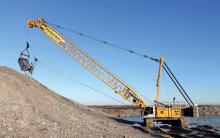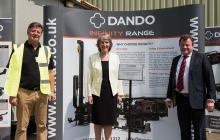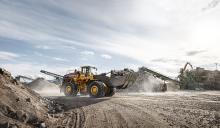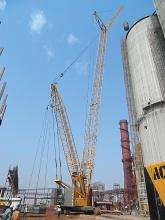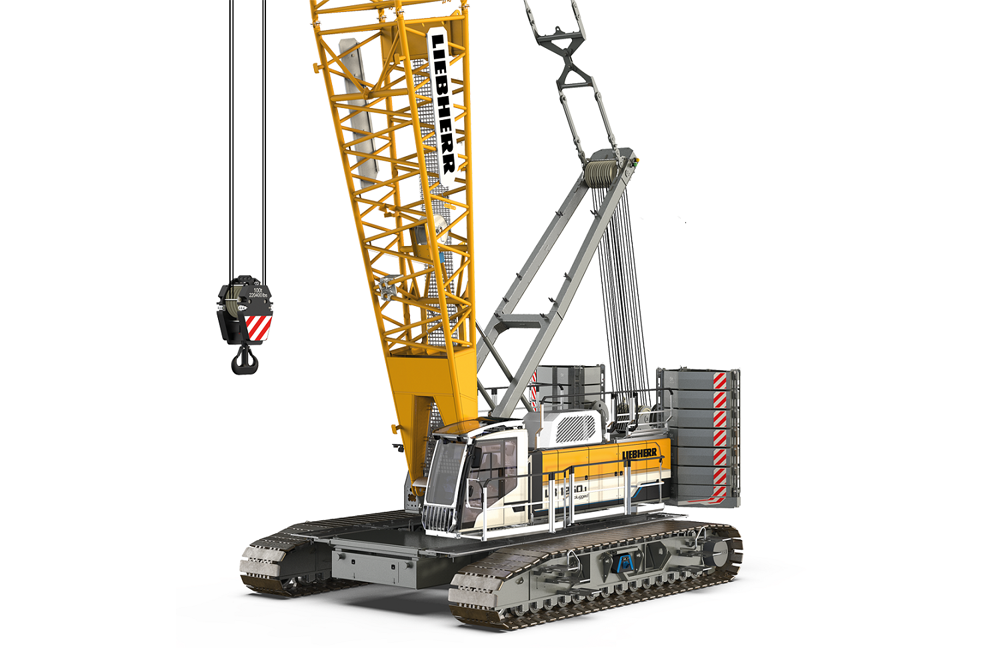
The LR 1200.1 unplugged and the LR 1250.1 unplugged are said to be the world’s first battery-powered crawler cranes. Both are driven by 255kW electric engines and can be used in aggregates production in a dragline configuration.
The models were introduced along with Liebherr’s new LRB 23 compact piling and drilling rig; and the 70-tonne lifting capacity HS 8070.1 duty cycle crawler crane to the global construction trade media in an online presentation.
The LR 1200.1 unplugged has a maximum lifting capacity of 200 tonnes, and the LR 1250.1 lifts 250 tonnes. Liebherr stresses that the two claimed ground-breaking battery-powered crawler cranes come with no compromises regarding performance or availability when compared with the conventional versions.
The blue accent in the models’ colour composition, which lends the distinctive look to the unplugged series, symbolises the electric solution representing an advanced technology. The unplugged cranes achieve the best possible combination of operator benefit, efficiency and environmental sustainability.
The new machines are emission-free and have a very low noise level. That is a huge advantage in areas sensitive to noise and also for the people working on the job site.
The cranes can be recharged on a conventional Jobsite electric supply (32 A, 63 A) in 4.5 hours and optionally with 125 A in 2.25 hours. The capacity of the battery is designed for four hours of lifting operation. Per their name, the cranes can be operated without a cable, thus ‘unplugged’ thanks to the battery-electric drive design.
The compact piling and drilling rig type LRB 23 closes the gap between the LRB 16 and the long-proven LRB 355.
The new all-rounder for deep foundation work offers an impressive engine output of 600 kW and so delivers the necessary capacity for all common deep foundation work, such as drilling with a Kelly drill, double rotary drill, full displacement equipment and continuous flight auger, as well as soil mixing and applications with a vibrator or hydraulic hammer.
Its compact design allows for transportation of the LRB 23 in one piece, so simplifying mobilisation between job sites. The remote control simplifies the loading process for transport as well as the assembly of the machine.
The advantages of the rigid leader are proven in operation. As it can withstand high torques, even Kelly drilling is possible, which is unique for a machine of this size! The rotary drive BAT 300 delivers a maximum torque of 300kNm. Locking of the Kelly bar’s telescopic sections is made significantly easier with the aid of the Kelly visualisation system in the LRB 23. Thanks to the real-time display of the Kelly bar’s locking recesses on the cabin monitor, the operator is permanently informed about the actual distance to the next locking recess. Colour indications inform when the bar can be locked. Furthermore, false positioning of the Kelly bar during the shake-off process is indicated through a warning signal.
During continuous flight auger drilling, the concreting process is automated thanks to the drilling assistant. All assistance systems contribute to time savings, higher availability of the machine and a significant increase in safety during operation. The newly designed piling and drilling rig are said to convince through precision, high performance and long service life.
With the new 70-tonne lifting capacity HS 8070.1, Liebherr unveils its newest generation of duty cycle crawler cranes. The machine is said to be an ideal choice for a multitude of applications: material handling, deep foundation work or lifting work.
Using the new self-loading system (Jack-Up System), the crawlers can be easily disassembled for transportation, so reducing the transport weight to less than 35 tonnes. The platforms and railings must no longer be removed before transport.
Instead of a single counterweight, the machine now has a modular system. The duty cycle crawler crane can be individually equipped depending on the application. Further, the boom of the HS 8070.1 is compatible with the HS 8100.1. Therefore, customers can use attachments such as the slurry wall grab HSG 5-18 on both machines and install thicker slurry walls with a more compact machine.
As opposed to the fixed system, the new floating A-frame system ensures higher performance in dynamic applications. It also simplifies and speeds up the assembly and transportation of the machine. The user-friendly design extends to the tank neck, which is easily accessible via a platform on the upper carriage – said to be a perfect example of the modern design strategy.
All colour compositions in the latest generation models combine the classic Liebherr yellow with new black, grey and white accents. The design reflects how long-standing tradition and company values unite with advanced technologies. The elegant colour scheme prevails through all product groups and lends the machines a distinctive look and immediate recognition.
Liebherr says the new design focuses on an even higher level of safety emphasised, above all, by improved platforms and railings on the upper carriage. Thanks to the additional add-on wing for mounting lights or cameras, the design is more flexible on the whole.
Inside the new cabin, the operator is said to experience immediately how the overall concept fits harmoniously together: reduced noise, panoramic view and pure operator comfort. This is achieved through a modern air-conditioning system with improved airflow, an optimised field of vision and an orthopaedic operator’s seat with integrated heating and cooling. Additional safety is provided by the stone protection, even in the toughest of applications.
Gerhard Frainer, managing director for sales at Liebherr-Werk Nenzing GmbH, said: “Especially the year 2020 has shown that one must be open-minded and bold to break new ground. With our unplugged cranes, we offer our customers an alternative drive design. As we have already seen with the LB 16 unplugged, the first battery-powered drilling rig, the strategy is a complete success.
"Strict requirements regarding environmental sustainability in tenders for construction projects increase the demand for advanced technologies. For us, it was clear that we extend and successfully establish the design in further product groups.”

